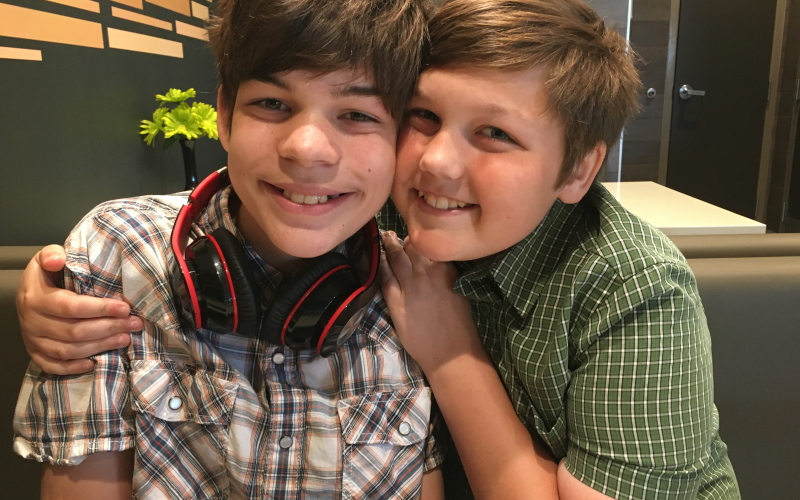
“They didn’t know life without the other one,” said Gloria, about her sons Grayson and Christian (pictured above)
By: Trish Adkins
Christian was best friends with his older brother, Grayson. The boys were just as close as brothers could be.
“They didn’t know life without the other one,” said their mother Gloria.
Then Grayson was diagnosed with anaplastic astrocytoma, an aggressive type of pediatric brain tumor, when he was just 14 years old. Christian was 12 years old. Grayson was in treatment constantly for the next two years; Christian was home.
Grayson died in March 2021, leaving his parents and his brother. The loss for the family was obviously crushing and left Gloria and her husband with having to grieve one son and also guide another through grief. Siblings, Gloria says, are sometimes called “the forgotten grievers.”
“Grief is a lifetime. It will ebb and flow for siblings,” said Kelly Goldin, the Bereavement Coordinator at the Children’s Hospital of Philadelphia. Kelly works with parents and surviving siblings as they navigate the death of a child and what comes after.
Understanding what siblings go through in the grief process is important when supporting a family who has lost a child to pediatric cancer. Here are five things that Kelly and Gloria shared with ALSF:
1. Grief will change as siblings grow.
How children process grief is influenced by their age and stage. And while their initial processing may happen when they are very young and able to use tools like play to express their emotions, the grief journey will be for their lifetime.
Kids may ask questions they know the answers to about their sibling and their death in an effort to ensure those facts did not change, said Kelly. For the surviving sibling’s support network, it is important to allow this revisiting of the death and acknowledge it in age-appropriate ways.
2. Anticipatory grief is part of the process.
When a child is placed in hospice, the grieving for the family truly begins. Siblings may find themselves managing this stage while also still navigating their regular life of school and sports and activities.
Kelly recommends ensuring siblings have their “person”—that one individual they can go to for support at school and in the community. Partnering directly with the school is important too, in this stage and beyond, to ensure children have a safe space to take breaks when the emotions become overwhelming.
3. Surviving siblings may have different emotions than their parents.
Christian, who is now 15 years old, struggled with anger in the early stages of his grief. His mom Gloria said this was so hard for them to watch and to live with—and she wasn’t angry over her older son’s death. Finally, they were able to have a talk as a family about Christian’s anger and to understand his perspective.
Kelly says this isn’t uncommon. Siblings and parents often have different emotions at different times. This is hard to navigate, but finding a middle ground can help everyone feel acknowledged and seen.
4. The grief process isn’t always linear.
Every child, family and parent is different. Grief comes with ups and downs. Sometimes siblings want to talk a lot about their missing brother or sister and sometimes they do not.
Gloria said it took Christian a long time to talk about his brother. Christian also struggled with now being the center of attention, after two years on the sidelines while his brother was in treatment.
Siblings can also sometimes be ready to move on to their own lives more quickly than their parents. Children are resilient, said Kelly, but still need space to grow on their own without their sibling’s legacy overshadowing them.
“Often, siblings struggle with a desire to express joy in an accomplishment or milestone, while also acknowledging a sibling should be there,” said Kelly.
5. Comfort and care are meaningful ways to help.
Grief is a lifetime for siblings. Kelly says finding tangible ways to support the family without offering the generic, “Let me know what I can do,” provides families with true support and comfort at a time when they have no idea what they need or want. If you have a close relationship with a surviving sibling, check in with them, take them to the park, grab an ice cream or support the family by mowing the lawn or running errands or taking on carpool runs.
Families can reach out to their home hospitals for sibling and grief support programs in their local area. The SuperSibs program, powered by Alex’s Lemonade Stand Foundation (ALSF), also provides a Grief and Loss Mailing Program for children ages 4 to 18. The program includes four mailings per year with parent resources and activities designed to provide children with gentle ways to cope with grief.
Gloria enrolled Christian in the program after ALSF reached out to the family following Grayson's death.
“I really appreciate that ALSF continues to support families affected by pediatric cancer, even after the child's death. The grief journey is so hard, in a different way than the cancer journey,” said Gloria.
More Resources for Grieving Siblings

